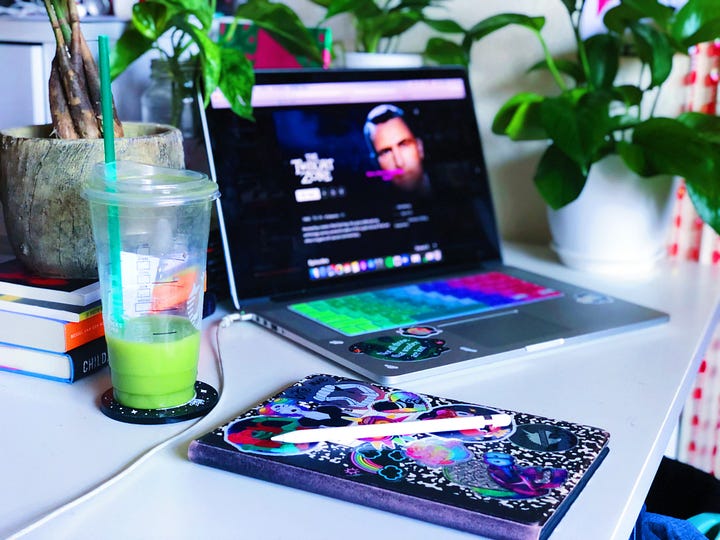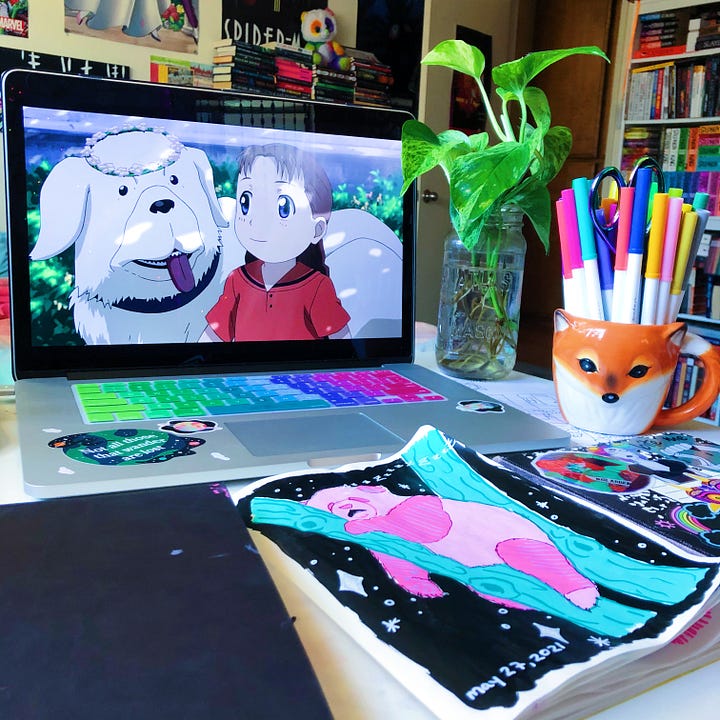Comfort in Repetition: The Science Behind Comfort Watching
Examining why we love revisiting familiar media, and whether it's actually good for us.
I’ve been leaning heavily into comfort shows and rewatching old favorites for my entire life, opting for the thing I’ve seen before and loved over the thing that’s new almost every time I’m given the choice. This extends mostly to movies, music, and TV shows, although occasionally I’ll fall into a re-reading binge again, or go back to an old game I really loved but have already played through.
I assumed this habit of “comfort rewatching” was a part of being Autistic, since it’s mentioned frequently within the Autistic community. But then I stumbled upon this article from 2020 on NPR’s blog about comfort watching becoming a bigger trend throughout the pandemic, and it got me thinking that maybe it isn’t just an Autistic thing after all!
Naturally, I followed that realization up with a thing that very much is: a rabbit hole of research specifically about comfort watching, and the science behind why we do it.
What qualifies as a “comfort watch”?
There are no hard rules for what a comfort show or movie has to be, because the things people find comfort in is as varied as the people themselves.
Even within a single person exists the duality of being able to comfort binge both shows like The Office and Law and Order: Special Victims Unit while feeling the same levels of enjoyment and familiarity (hi, it’s me!), so it’s not surprising that there’s no real way to label something as comforting or not.
If it can make you feel better, improve your mood, help you feel safe, and you love it no matter how many times you’ve seen it, it’s probably something you can count as a comfort watch.
Each person will have their own media to return to, but I have noticed there are a few favorites shared among many different people:
The Office (even Billie Eilish has talked about how much she loves this one!)
Gilmore Girls (an annual fall classic!)
Seinfeld & Frasier (both shows I am unfortunately not into myself, but I know a lot of people that love them!)
One of the most important things to note about comfort rewatching is that the things we’re watching don’t have to necessarily be happy. Although a lot of folks seem to gravitate towards more sitcom-style shows or comedies, there are also a good amount of people that find comfort in the familiarity of darker themes or characters.
A lot of the time, seeing someone dealing with difficult situations can help put your own into perspective, which improves the mood and leaves you feeling better despite the subject matter you may have seen. (Although, of course, this isn’t the case for everyone - some people may feel worse after an episode of SVU, for example!)
Some of my favorite movies are actually horror movies, which some people may find strange but I have several friends who feel the same way! A few favorites I’ve seen countless times:
Resident Evil
Hell House, LLC
Scream


Why do we comfort watch?
Although the content we’re comfort watching can vary widely, the reasoning behind why we actually do it is pretty straightforward - and it’s even backed by scientific research!
PREDICTABILITY & ESCAPISM
Because we’ve seen it already, we always know what’s going to happen, which can be an essential quality when we’re choosing what to watch in a time when our day to day lives are filled with such turbulence and chaos.
From decision fatigue to overall stressors coming in from the world at large around us, many of us are dealing with both cognitive and sensory overload every day already. Adding new media to the mix can feel like too much of an investment of both our time and our mental capacities, so comfort rewatching can be a time of self-soothing after a busy, difficult day of existing.
TV shows and movies both also have the added benefit of allowing us to escape into the worlds and characters and situations they’ve created, fully immersing ourselves in a way can give us a reprieve from some of the things going on outside them. While it’s always a good idea to be mindful of when we’re using escapism in unhealthy ways, it can be a useful tool to use when we need it.
THE LOW RISK, HIGH REWARD FACTOR
There’s really no down side to rewatching an episode of a show we love, or seeing a movie again that we know we already enjoy; the most eventful thing that can happen during it is that we may learn something new! Even when our media is extremely predictable, there are small moments that we may have missed or not have picked up on the first few (or few hundred) times around that can be extremely fun to notice upon further rewatches. Similarly, sometimes we learn something new that adds a deeper layer of understanding or context to something we’re familiar with, which can make us want to go back and experience it again.
With things like memoirs being published (looking at you, Emily Gilmore!) and new podcasts by cast members (check out the Office Ladies podcast, hosted by the women that played Pam and Angela in The Office), even the things we’re most familiar with can surprise and delight us in new ways, which can give us a deeper appreciation and love for the media itself in general.
THE MERE-EXPOSURE EFFECT
Also called the “familiarity principle”, this is the tendency people have to like things because they’re familiar to us, or the more we’re exposed to them, which could logically lead to us wanting to watch them more.
Once we’ve done something, doing it again can increase our perceptual fluency, which allows us to process information more efficiently in follow-up experiences with that same stimulus. Basically, by watching things more than once, it becomes easier for us to not just watch it, but also understand and enjoy it later.
THE LURE OF NOSTALGIA
There’s something to be said for leaning into nostalgia and the “ambient TV” vibes of a lot of our youth: I fondly remember daytime talk shows on in the background when I was home from school sick, or episodes of certain things being on in the morning as I got ready for the day as a teen.
Specifically, I remember Charmed being on with 2 episodes in the morning before I left for high school, and then 2 more episodes on in the afternoon once I’d gotten home - a real treat for me, especially because the episodes never had a repeat in the same day, and usually followed the actual proper order.
Now that I’m older, I still love watching it, especially with my breakfast! I associate it with mornings mostly, and with being a kid and being excited about the day ahead, and of the possibility of each new day. It’s such a nice, nostalgic, comfy vibe, making it a perfect example of one of my oldest comfort shows.
Similarly, I also rewatch a lot of Star Trek as an adult since I grew up with my dad carefully recording, labeling, & collecting his VHS tapes of every episode. I spent so much of my childhood watching it that it’s not surprising how much I still love it now.
As I’ve gotten older, I’ve also found my own reasons to love the show, especially Voyager and Captain Janeway herself. This ties back into the low risk, high reward thing I mentioned earlier: there’s no risk involved in watching something I enjoyed a lot as a kid, since even if I don’t like it as much now, that won’t lessen the love I had for it back then. However, there is the potential reward of appreciating it even more as an adult, with my own adult experiences and situations to use as a base of understanding.


Is comfort watching good for us?
Sometimes I find myself feeling a little guilty for not taking advantage of the newer things available to me, instead opting to return again to something I’ve seen a dozen times or more. I wanted to look into whether there may be any benefits to rewatching comfort favorites, especially in comparison to watching stuff that might be newer to me. And I’m happy to report that yes, it’s actually good for us!
REWATCHING FOR OUR HEALTH
Comfort watching our favorite things can improve not just our moods, but our bodies and our minds, too. The activity of revisiting things we love and are familiar with can be extremely beneficial for people suffering from things like acute chronic stress, as well as depression or other mood disorders. It’s also shown to be helpful in less severe times of stress or upset, like a big move or the ending of a relationship, because it can help increase our emotional pain threshold and increase our feelings of social bonding.
The next time you’re in a funk, try lessening your cognitive and emotional load with a binge of something silly and familiar - it might help!
REGULATING THE NERVOUS SYSTEM
While new stuff can be very fun and exciting, it can also naturally activate our body’s fight-or-flight response by increasing our heart rate or blood flow when something unexpected happens. Keeping our bodies in this kind of heightened state can be unhealthy because it can overtax our nervous systems, especially considering how stressful and hectic our normal days are already.
Because of this, it can be nice to have a break with things we’ve seen before. Since they’ve familiar, it allows our body’s parasympathetic system to release chemicals meant to put your body into a relaxed, restful state. Everything from your breathing to your blood pressure and heart rate can have a chance to calm down.
RESTORING OUR SELF-CONTROL
Research shows that our skills of decision making and self-control can be depleted over time, making them finite resources available to us in our social interactions. While restoring these can be done via positive social interactions, negative ones can have a debilitating effect on our well-being and ability to complete our day-to-day tasks, which makes the act of socialization risky after a difficult day.
One study shows that by intentionally choosing to revisit familiar fictional worlds and immersing ourselves within them for short periods of time, we can actually do the same thing as positively interacting socially. The fictional world acts as a sort of substitution for the act of socializing itself, possibly due to the potentially social nature of the show or movie, and we get the same benefits of self-control restoration.
This means if you’re debating between meeting your pals for drinks and rewatching The Good Place (again), you can feel secure in the knowledge that the latter may actually be a more reliable choice overall.


All this to say, look: we’ve all been on our 5th binge of a show we love, and it’s okay! Don’t feel embarrassed or bad about rewatching Buffy the Vampire Slayer for the billionth time, because it’s actually good for both your brain and your body. And there’s science to back it up if anyone wants to suggest otherwise!
The next time you feel like having a little background binge, pick up the remote and go for it. That unwatched new movie can sit in the queue for another night, and your future less stressed self might thank you for it later!
I’d also love any feedback on this kind of post, ‘cause I loved doing the research for it and writing it - if this is something you enjoyed reading, please let me know. :)








